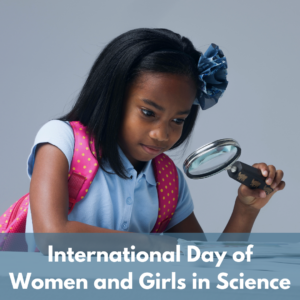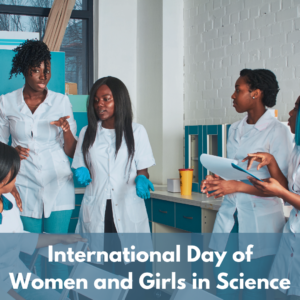Science and technology are at the heart of modern development, shaping the world we live in. Yet, for centuries, women and girls—especially Black women—have been underrepresented, overlooked, and, in many cases, actively discouraged from participating in scientific fields. February 11, the International Day of Women and Girls in Science, is a day to recognize the contributions of women in STEM (Science, Technology, Engineering, and Mathematics), highlight the barriers they continue to face, and push for a future where science is truly inclusive.

Nigerian Women Leading the Way
While women in science face barriers, many Nigerian women have broken through these obstacles, making groundbreaking contributions to their fields. Here are a few that young Nigerians can look up to:
1. Dr. Ozak Esu (Electrical Engineer)
Dr. Ozak Esu is a Nigerian-born electrical engineer recognized for her contributions to sustainable energy solutions.
2. Professor Francisca Nneka Okeke (Physicist)
Professor Francisca Okeke is a Nigerian physicist known for her research in geomagnetism. She became the first female head of the Physics Department at the University of Nigeria, Nsukka.
3. Dr. Eucharia Oluchi Nwaichi (Environmental Biochemist)
Dr. Eucharia Nwaichi is a biochemist whose work focuses on environmental pollution and bioremediation—
4. Dr. Adeola Olubamiji (Biomedical Engineer)
Dr. Adeola Olubamiji made history as the first Black person to earn a PhD in Biomedical Engineering from the University of Saskatchewan, Canada.
5. Dr. Wendy Okolo (Aerospace Engineer)
Dr. Wendy Okolo is a Nigerian aerospace engineer and one of the first Black women to obtain a PhD in the field.
Opportunities and Free Resources for Women in STEM
Despite the gender gap in STEM, various organizations are providing funding, mentorship, and learning opportunities to support women and girls in science. Unicaf is offering 100 scholarship vouchers worth £10,000 each to women pursuing higher education in STEM, helping to reduce financial barriers. Initiatives like the AWARD Fellowship and She Code Africa provide mentorship and community support for women in science and tech.
For those looking to build skills in technology, platforms like Coursera offer free courses through financial aid, allowing learners to earn certificates that enhance job prospects. Other valuable resources include the Google Africa Developer Scholarships for coding and mentorship, She Code Africa for free tech workshops, TechHer for digital literacy and advocacy programs tailored for women. Additionally, LinkedIn Learning provides a free trial for courses on coding, data science, and project management.
The Future of Women in Science
Increasing the number of women in STEM is not just about fairness—it’s about progress. This International Day of Women and Girls in Science, let’s commit to supporting women in STEM, and ensuring that every girl with a passion for science has the opportunity to pursue it. Whether you are a teacher, a parent, a policymaker, or a student, you have a role to play in making STEM more inclusive.

